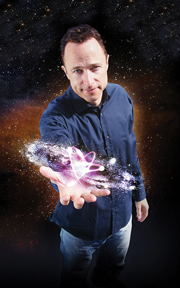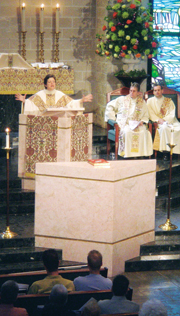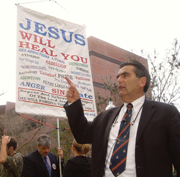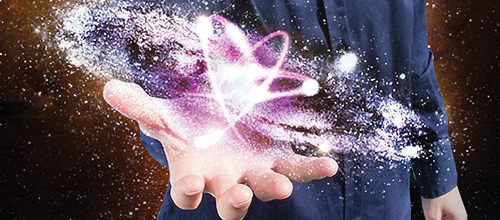Roger Nygard ponders the most basic—yet most difficult—concepts of life in ‘The Nature of Existence’
by Blase DiStefano
Why do we exist? “To figure out why I exist” and “Nonexistence has nothing to recommend it” are only two of the many, diverse answers from subjects interviewed by director Roger Nygard in his new documentary, The Nature of Existence. Other questions about religion, science, God, faith, truth, scripture, and morality are posed to religious leaders, renowned scientists, comedians, and many others.
The 48-year-old Nygard, probably best known for Trekkies (a feature-length doc about Star Trek fans), also directs, writes, and edits for television series, including The Office and Curb Your Enthusiasm. So you know he’s got a sense of humor, which is evident in both his new film and this OutSmart interview.
 Blase DiStefano: Let’s start off with something simple, not like the questions you ask in the film! Of all the places you traveled, which one was the most interesting, and why?
Blase DiStefano: Let’s start off with something simple, not like the questions you ask in the film! Of all the places you traveled, which one was the most interesting, and why?
Roger Nygard: India was hard to top. The whole country is like one big holy site. My shoes were off more than they were on. Tip to India travelers: bring flip-flops. Every direction you look is a photogenic tableau. The place that gave me chills up my spine though was Stonehenge. Maybe because it’s so ancient—it’s over 5,000 years old! Seeing those iconic stones in person was surreal.
Of all the people you interviewed, whose answers seemed to resonate with you most?
The answers that resonated most for me were from anybody who I felt was honestly seeking truth, wherever it may lead—because that’s how I felt about my journey. I could listen to the particle physicists and string theorists for hours, yet it seemed like minutes.
But old people are the best! They will tell you the way it is, they don’t censor themselves, they don’t give a shit what people think about them.
In answer to your question “What is the definition of God?” evangelist David Miller said, “God is love. I think when we have found love, we have found God.” He was wearing a button that showed a circle with the word homo in it and a line crossed through the word. What was going through your mind while he was spouting off?
I immediately had the feeling that he might be gay. That moment reminded me of a quote from Robert Pirsig’s Zen and the Art of Motorcycle Maintenance: “We always condemn most in others, that which we most fear in ourselves.” How many times do those who most loudly condemn others have to be found guilty of doing that which they condemn before a pattern emerges?
Sri Sri Ravi Shankar says in the movie, “Happiness is discovering your true nature.” That struck me as brilliant in its simplicity. Once a person discovers who they are, and they begin living in concert with their true nature, they will be much happier. If you live your life trying to reach a goal set for you by others, by society, by organized religion, or whatever, if that goal isn’t in concert with who you are, you will live a life frustrated and unhappy. If God didn’t want people to be gay, why would he make some people whose hearts are drawn to others of their own gender? Can we choose how we feel? I don’t think we can choose who we fall in love with.
Since God is not male or female, did anyone say that they refer to God as “it”? What was the most common answer to that question?
Far more people referred to a patriarchal god. The goddess is currently out of favor, but [feminine deities were common] in many ancient societies.
As for the most common answer, what was most common was a lack of agreement. Mahatma Gandhi said, “There are as many religions as there are individuals.” Similarly, there are probably as many definitions of God as there are people.

In the film there is a string of answers where people define God as: nature, love, the answer, omnipotent, everywhere, everything…. If something is everything, then it’s also nothing. Einstein borrowed Spinoza’s definition, saying that God is the laws of the Universe. I think God is the word we use to refer to our desire to be connected to something greater than ourselves.
Tell me about visiting the LGBT church in Dallas.
The Cathedral of Hope is a haven for the nonjudgmental. I love that attitude! I also love what Canon Coy James told me: “I think that it’s the biggest gay church in the world because God has a sense of humor. Texas is a very conservative state. But I think it’s also because that’s where it’s needed the most.”
I was so lucky to be there for a service when Rev. Dr. Jo Hudson told a heartfelt story about when she was in the seminary and somebody accused her of being a lesbian. With her entire future career at stake, she had to make a choice. Would she be true to her heart, or would she choose to live a lie?
What do you think of Brother Jed Smock? Did you see anyone who agreed with what he was saying?
Brother Jed Smock calls himself a confrontational evangelist. He knows how to get attention. He’s very entertaining. He’s a master at his craft.
Many people believe Jed’s message. At the end of the day, there are always a few who stay to genuinely listen to him. One student told me, “I do believe most of what he’s saying, and I have to admit in my head I am ridiculing him at the same time because of how radical he is.”

What do you think of Ultimate Christian Wrestling?
They were really nice people—when they weren’t bashing heads in the ring. You have to see their show to believe it. It’s certainly one of the “jaw on the floor” moments in the film.
It may seem weird to hear me say this if you’ve seen all the people in the movie, but there’s nobody in it that I dislike. I like people. I may disagree with many of them. But one lesson I learned is that when it comes to beliefs, we are never all going to agree. Never. But our only hope is if we get to know each other. The more I traveled while making this movie, the more I learned about other people and other cultures and other beliefs. I didn’t necessarily have to change my beliefs; I just learned why people believe other things. As Mark Twain said, “Travel is fatal to prejudice, bigotry, and narrow-mindedness.”
Were you able to ask the pope any of the questions? If not, why not?
It’s not easy to see the pope. I don’t want to give out any spoilers about my interaction with the pope before people see the film, but I did get within six feet of the pope and have a moment with him.
What was the best part of making this film?
Taking a journey with no idea where it would lead me. It’s exciting and scary at the same time. I never knew who I would meet next. And the food! One reason I exist is to sample culinary delights all over the world.
What was the worst part?
Traveler’s diarrhea. I had the worst chicken fried rice ever in China. Note to travelers: if you see the chef rinse the chicken in the river, you probably shouldn’t eat it. I also had the best BBQ chicken ever at the Holy Smoke BBQ in Huntsville, Texas. The best and the worst chicken, both in the same movie.
The inevitable question: are you in a relationship? If yes, the inevitable second question would be: with a man or woman? If no, the inevitable second question would be: do you date men, women, or both, or neither? This is getting complicated. Shit, are you gay?
[Laughs] I’m straight. I’m single. Never been married. Wait a minute, what’s wrong with that picture?
I am mystified by marriage and relationships, and in looking for a subject to tackle next, I realized that “The Nature of Marriage” is even more inexplicable to me—more of a challenge than the very nature of existence itself. Check back for all the answers to that one in a couple years….
Ending with The Big Ones: two of the questions you ask in the film are “Why do we exist?” and “Is there a God?” When you ask yourself these questions, what are your answers?
We exist for many reasons. Here’s one purpose: to create and to share your creation with others. Create something today…a painting, a dance, a short story, a dress, a garden, a recipe, a new skateboard trick, whatever moves you…. When people have nothing to contribute to society, when they are not creating and expressing themselves, they get depressed. As Julia Sweeney told me, “Happiness isn’t a goal, it’s a byproduct of having a purpose in life.” For many people, the default is to create another human. That sort of creation will keep you busy for a couple of decades. Then you can get back to painting again.
To find God, I think we have to examine the very fabric of existence. An atom is 99.999999 percent empty space. We are made of atoms that are made of mostly nothing, but still we exist, we are conscious, and part of being conscious is to yearn for a purpose greater than simply reproducing our genes. It’s in that space between the mostly nothing and our self-aware existence that we look for more—something intangible—and, for lack of a better definition, we may call it soul, or spirit, or life force, or simply consciousness. Is there one religion or philosophy that best represents that intangibility? Maybe, or maybe not. Science is the one approach that has the ability to actually look in that space. What will we find in microscopic bursts of energy as we collide proton beams? I don’t know, but it sure is exciting to be alive when it’s happening…
View The Nature of Existence movie trailer at www.thenatureofexistence.com. The film opens July 23 at Angelika Film Center. Info/tickets: 713/225-1740, www.angelikafilmcenter.com.











